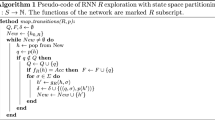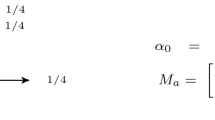Abstract
Active learning algorithms to infer probabilistic finite automata (PFA) have gained interest recently, due to their ability to provide surrogate models for some types of neural networks. However, recent approaches either cannot guarantee determinism, which makes the automaton harder to understand and compute, or they rely on techniques that bound errors on individual transitions. In this work we propose a derivative of the recent \(L^{\#}\) algorithm to learn deterministic PFA (PDFA) from systems returning a distribution over a set of tokens given an input string. Along with determinism, we can give error bounds on probabilities assigned to whole strings with an easy to understand approach. We show formal correctness of our algorithm and test it on neural networks trained to model three datasets from computer- and network-systems respectively. We show that the algorithm can learn the network’s behaviour closely, and provide an example application of how the model can be used to interpret the network. We note that our approach is in theory applicable in general to learn deterministic weighted finite automata. We provide the source code of our algorithm and relevant scripts on our public repository.
Access this chapter
Tax calculation will be finalised at checkout
Purchases are for personal use only
Similar content being viewed by others
Notes
- 1.
- 2.
The presence of such a symbol is a reasonable assumption. E.g. in natural language processing this is commonly referred to as the <EOS> (end-of-sentence) symbol.
- 3.
Because we describe our algorithm at all stages, it was not always clear on how we should refer to the individual states and nodes of the automaton. For simplicity we decided to stick to the word ‘state’ meaning both state and node from here on, as they are mostly interchangeable for us.
References
Angluin, D.: Learning regular sets from queries and counterexamples. Inf. Comput. 75(2), 87–106 (1987)
Balle, B., Carreras, X., Luque, F.M., Quattoni, A.: Spectral learning of weighted automata: a forward-backward perspective. Mach. Learn. 33–63 (2014)
Du, M., Li, F., Zheng, G., Srikumar, V.: Deeplog: anomaly detection and diagnosis from system logs through deep learning. In: Proceedings of the 2017 ACM SIGSAC Conference on Computer and Communications Security, CCS 2017, pp. 1285–1298. Association for Computing Machinery, New York (2017)
Eyraud, R., Ayache, S.: Distillation of weighted automata from recurrent neural networks using a spectral approach. Mach. Learn. (2021)
García, S., Grill, M., Stiborek, J., Zunino, A.: An empirical comparison of botnet detection methods. Comput. Secur. 45, 100–123 (2014)
He, P., Zhu, J., Zheng, Z., Lyu, M.R.: Drain: an online log parsing approach with fixed depth tree. In: 2017 IEEE International Conference on Web Services (ICWS), pp. 33–40 (2017)
de la Higuera, C.: Grammatical Inference: Learning Automata and Grammars. Cambridge University Press, Cambridge (2010)
Hofstede, R., et al.: Flow monitoring explained: from packet capture to data analysis with NetFlow and IPFIX. IEEE Commun. Surv. Tutor. 16(4), 2037–2064 (2014)
Lang, K.J., Pearlmutter, B.A., Price, R.A.: Results of the Abbadingo one DFA learning competition and a new evidence-driven state merging algorithm. In: Honavar, V., Slutzki, G. (eds.) ICGI 1998. LNCS, vol. 1433, pp. 1–12. Springer, Heidelberg (1998). https://doi.org/10.1007/BFb0054059
Marzouk, R., de la Higuera, C.: Distance and equivalence between finite state machines and recurrent neural networks: computational results. CoRR (2020). https://arxiv.org/abs/2004.00478
Mayr, F., Yovine, S.: Regular inference on artificial neural networks. In: Holzinger, A., Kieseberg, P., Tjoa, A.M., Weippl, E. (eds.) CD-MAKE 2018. LNCS, vol. 11015, pp. 350–369. Springer, Cham (2018). https://doi.org/10.1007/978-3-319-99740-7_25
Mayr, F., Yovine, S., Carrasco, M., Pan, F., Vilensky, F.: A congruence-based approach to active automata learning from neural language models. In: Coste, F., Ouardi, F., Rabusseau, G. (eds.) Proceedings of 16th edition of the International Conference on Grammatical Inference. Proceedings of Machine Learning Research, vol. 217, pp. 250–264. PMLR (2023)
Mayr, F., Yovine, S., Pan, F., Basset, N., Dang, T.: Towards efficient active learning of PDFA (2022)
Muškardin, E., Aichernig, B.K., Pill, I., Tappler, M.: Learning finite state models from recurrent neural networks. In: ter Beek, M.H., Monahan, R. (eds.) Integrated Formal Methods, pp. 229–248. Springer, Cham (2022). https://doi.org/10.1007/978-3-031-07727-2_13
Okudono, T., Waga, M., Sekiyama, T., Hasuo, I.: Weighted automata extraction from recurrent neural networks via regression on state spaces (2019)
Oliner, A., Stearley, J.: What supercomputers say: a study of five system logs. In: 37th Annual IEEE/IFIP International Conference on Dependable Systems and Networks (DSN 2007), pp. 575–584 (2007)
Pellegrino, G., Lin, Q., Hammerschmidt, C., Verwer, S.: Learning behavioral fingerprints from netflows using timed automata. In: 2017 IFIP/IEEE Symposium on Integrated Network and Service Management (IM), pp. 308–316 (2017)
Vaandrager, F., Garhewal, B., Rot, J., Wißmann, T.: A new approach for active automata learning based on apartness. In: Fisman, D., Rosu, G. (eds.) TACAS 2022. LNCS, vol. 13243, pp. 223–243. Springer, Cham (2022). https://doi.org/10.1007/978-3-030-99524-9_12
Weiss, G., Goldberg, Y., Yahav, E.: Learning deterministic weighted automata with queries and counterexamples. In: Wallach, H., Larochelle, H., Beygelzimer, A., d’ Alché-Buc, F., Fox, E., Garnett, R. (eds.) Advances in Neural Information Processing Systems, vol. 32. Curran Associates, Inc. (2019)
Weiss, G., Goldberg, Y., Yahav, E.: Extracting automata from recurrent neural networks using queries and counterexamples. Mach. Learn. (2022)
Xu, W., Huang, L., Fox, A., Patterson, D., Jordan, M.I.: Detecting large-scale system problems by mining console logs. In: Proceedings of the ACM SIGOPS 22nd Symposium on Operating Systems Principles, SOSP 2009, pp. 117–132. Association for Computing Machinery, New York (2009)
Zhu, J., et al.: Tools and benchmarks for automated log parsing. In: Proceedings of the 41st International Conference on Software Engineering: Software Engineering in Practice, ICSE-SEIP 2019, pp. 121–130. IEEE Press (2019)
Acknowledgments
This work is supported by NWO TTW VIDI project 17541 - Learning state machines from infrequent software traces (LIMIT).
Author information
Authors and Affiliations
Corresponding author
Editor information
Editors and Affiliations
Rights and permissions
Copyright information
© 2024 The Author(s), under exclusive license to Springer Nature Switzerland AG
About this paper
Cite this paper
Baumgartner, R., Verwer, S. (2024). PDFA Distillation with Error Bound Guarantees. In: Fazekas, S.Z. (eds) Implementation and Application of Automata. CIAA 2024. Lecture Notes in Computer Science, vol 15015. Springer, Cham. https://doi.org/10.1007/978-3-031-71112-1_4
Download citation
DOI: https://doi.org/10.1007/978-3-031-71112-1_4
Published:
Publisher Name: Springer, Cham
Print ISBN: 978-3-031-71111-4
Online ISBN: 978-3-031-71112-1
eBook Packages: Computer ScienceComputer Science (R0)




